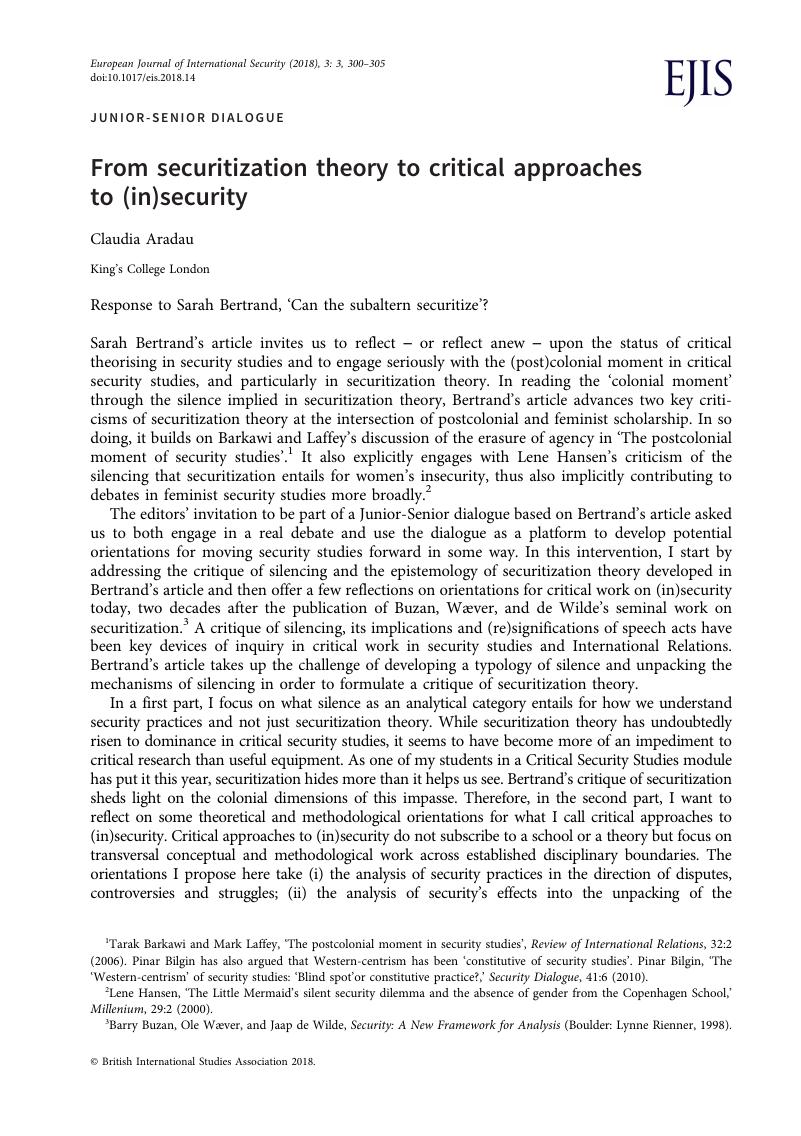Published online by Cambridge University Press: 12 September 2018

1 Barkawi, Tarak and Laffey, Mark, ‘The postcolonial moment in security studies’, Review of International Relations, 32:2 (2006)Google Scholar. Pinar Bilgin has also argued that Western-centrism has been ‘constitutive of security studies’. Bilgin, Pinar, ‘The ‘Western-centrism’ of security studies: ‘Blind spot’or constitutive practice?,’ Security Dialogue, 41:6 (2010)CrossRefGoogle Scholar.
2 Hansen, Lene, ‘The Little Mermaid’s silent security dilemma and the absence of gender from the Copenhagen School,’ Millenium, 29:2 (2000)CrossRefGoogle Scholar.
3 Buzan, Barry, Wæver, Ole, and de Wilde, Jaap, Security: A New Framework for Analysis (Boulder: Lynne Rienner, 1998)Google Scholar.
4 Weheliye, Alexander G, Habeas Viscus: Racializing Assemblages, Biopolitics, and Black Feminist Theories of the Human (Durham, NC: Duke University Press, 2014), p. 14 CrossRefGoogle Scholar.
5 Sarah Bertrand, ‘Can the subaltern securitize? Postcolonial perspectives on securitisation theory and its critics’, European Journal of International Security, 3:3 (2018), pp. 281–99 (p. 287).
6 Simplican, Stacy Clifford, The Capacity Contract: Intellectual Disability and the Question of Citizenship (Minneapolis: University of Minnesota Press, 2015), p. 68 CrossRefGoogle Scholar.
7 Bertrand, ‘Can the subaltern securitize?’, p. 283.
8 Wæver, Ole, ‘The theory act: Responsibility and exactitude as seen from securitisation’, International Relations, 29:1 (2015)CrossRefGoogle Scholar.
9 Butler, Judith, Notes toward a Performative Theory of Assembly (Harvard University Press, 2015)CrossRefGoogle Scholar.
10 Butler, Judith, Excitable Speech: A Politics of the Performative (London: Routledge, 1997), pp. 81–82 Google Scholar.
11 On resistance to sovereign power through silence, see Edkins, Jenny and Pin-Fat, Véronique, ‘Through the wire: Relations of power and relations of violence’, Millennium, 34:1 (2005)Google Scholar.
12 Brown, Wendy, Edgework: Critical Essays on Knowledge and Politics (Princeton, NJ: Princeton University Press, 2005), p. 97 Google Scholar.
13 Ibid., p. 85.
14 Browne, Simone, Dark Matters: On the Surveillance of Blackness (Durham: Duke University Press, 2015), p. 67 CrossRefGoogle Scholar.
15 (In)visibility has made possible nuanced understandings of the relations between governing practices and resistance, without necessarily having recourse to securitisation. On (in)visibility, governance, and resistance, see Ansems de Vries, Leonie, ‘Politics of (in)visibility: Governance-resistance and the constitution of refugee subjectivities in Malaysia’, Review of International Studies, 42:5 (2016)CrossRefGoogle Scholar and Tazzioli, Martina and Walters, William, ‘The sight of migration: Governmentality, visibility and Europe’s contested borders’, Global Society, 30:3 (2016)CrossRefGoogle Scholar.
16 Bertrand, ‘Can the subaltern securitize?’, p. 295.
17 von Redecker, Eva, ‘Anti-Genderismus and right‑wing hegemony’, Radical Philosophy, 198 (2016)Google Scholar.
18 Bertrand, ‘Can the subaltern securitize?’, p. 295.
19 Montesinos Coleman, Lara and Rosenow, Doerthe, ‘Security (studies) and the limits of critique: Why we should think through struggle’, Critical Studies on Security, 4:2 (2016), p. 216 CrossRefGoogle Scholar.
20 For analysis and arguments concerning struggles and controversies, see Lara Montesinos Coleman and Doerthe Rosenow, ‘Security (studies) and the limits of critique: Why we should think through struggle’, and Schouten, Peer, ‘Security as controversy: Reassembling security at Amsterdam Airport’, Security Dialogue, 45:1 (2014)CrossRefGoogle Scholar. The concept of disputes was developed by Boltanski, Luc and Thévenot, Laurent, ‘The sociology of critical capacity’, European Journal of Social Theory, 2:3 (1999)CrossRefGoogle Scholar. Anna Tsing has proposed the concept of ‘friction’ to include not just contestation, but many other interactions such as translation, alliance, or accommodation. Tsing, Anna, ‘Frictions’, in The Wiley-Blackwell Encyclopedia of Globalization (John Wiley & Sons, Ltd, 2012)Google Scholar.
21 Weizman, Eyal, Forensic Architecture: Violence at the Threshold of Detectability (Cambridge, MA: MIT Press, 2017)Google Scholar.
23 Aradau, Claudia, ‘Assembling (non) knowledge: Security, law, and surveillance in a digital world’, International Political Sociology, 11:4 (2017)Google Scholar.
24 Good, Anthony, ‘Anthropologists as providers of country of origin information in the British asylum courts’, in Benjamin N. Lawrance and Galya Ruffer (eds), Adjudicating Refugee and Asylum Status: The Role of Witness, Expertise, and Testimony (Cambridge: Cambridge University Press, 2012)Google Scholar.
25 Subsequently, this proposal was rejected by German parliamentarians, while increased police and surveillance measures were put in place.